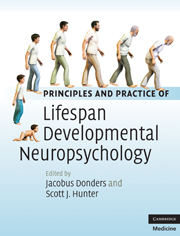Book contents
- Frontmatter
- Contents
- Contact information for authors
- Biography for Jacobus Donders and Scott J. Hunter
- Introduction
- Section I Theory and models
- Section II Disorders
- 5a Attention deficit hyperactivity disorder in children and adolescents
- 5b Attention deficit hyperactivity disorder in adults
- 5c Attention deficit hyperactivity disorder: a lifespan synthesis
- 6a Learning disorders in children and adolescents
- 6b Learning disorders in adults
- 6c Synthesis of chapters on learning disabilities: overview and additional perspectives
- 7a Infants and children with spina bifida
- 7b Adolescence and emerging adulthood in individuals with spina bifida: a developmental neuropsychological perspective
- 7c Spina bifida/myelomeningocele and hydrocephalus across the lifespan: a developmental synthesis
- 8 Cerebral palsy across the lifespan
- 9a Intellectual disability across the lifespan
- 9b Lifespan aspects of PDD/autism spectrum disorders (ASD)
- 9c Autism spectrum disorders and intellectual disability: common themes and points of divergence
- 10a Hearing loss across the lifespan: neuropsychological perspectives
- 10b Visual impairment across the lifespan: neuropsychological perspectives
- 11a Traumatic brain injury in childhood
- 11b Adult outcomes of pediatric traumatic brain injury
- 11c Neurobehavioral aspects of traumatic brain injury sustained in adulthood
- 11d Traumatic brain injury in older adults
- 11e Traumatic brain injury across the lifespan: a long-term developmental perspective
- 12a Pediatric aspects of epilepsy
- 12b A lifespan perspective of cognition in epilepsy
- 13a Leukemia and lymphoma across the lifespan
- 13b Lifespan aspects of brain tumors
- 14 Lifespan aspects of endocrine disorders
- 15 Metabolic and neurodegenerative disorders across the lifespan
- 16a Psychopathological conditions in children and adolescents
- 16b Psychopathological conditions in adults
- 16c Neuropsychological aspects of psychopathology across the lifespan: a synthesis
- Index
- Plate section
- References
10a - Hearing loss across the lifespan: neuropsychological perspectives
from Section II - Disorders
Published online by Cambridge University Press: 07 May 2010
- Frontmatter
- Contents
- Contact information for authors
- Biography for Jacobus Donders and Scott J. Hunter
- Introduction
- Section I Theory and models
- Section II Disorders
- 5a Attention deficit hyperactivity disorder in children and adolescents
- 5b Attention deficit hyperactivity disorder in adults
- 5c Attention deficit hyperactivity disorder: a lifespan synthesis
- 6a Learning disorders in children and adolescents
- 6b Learning disorders in adults
- 6c Synthesis of chapters on learning disabilities: overview and additional perspectives
- 7a Infants and children with spina bifida
- 7b Adolescence and emerging adulthood in individuals with spina bifida: a developmental neuropsychological perspective
- 7c Spina bifida/myelomeningocele and hydrocephalus across the lifespan: a developmental synthesis
- 8 Cerebral palsy across the lifespan
- 9a Intellectual disability across the lifespan
- 9b Lifespan aspects of PDD/autism spectrum disorders (ASD)
- 9c Autism spectrum disorders and intellectual disability: common themes and points of divergence
- 10a Hearing loss across the lifespan: neuropsychological perspectives
- 10b Visual impairment across the lifespan: neuropsychological perspectives
- 11a Traumatic brain injury in childhood
- 11b Adult outcomes of pediatric traumatic brain injury
- 11c Neurobehavioral aspects of traumatic brain injury sustained in adulthood
- 11d Traumatic brain injury in older adults
- 11e Traumatic brain injury across the lifespan: a long-term developmental perspective
- 12a Pediatric aspects of epilepsy
- 12b A lifespan perspective of cognition in epilepsy
- 13a Leukemia and lymphoma across the lifespan
- 13b Lifespan aspects of brain tumors
- 14 Lifespan aspects of endocrine disorders
- 15 Metabolic and neurodegenerative disorders across the lifespan
- 16a Psychopathological conditions in children and adolescents
- 16b Psychopathological conditions in adults
- 16c Neuropsychological aspects of psychopathology across the lifespan: a synthesis
- Index
- Plate section
- References
Summary
Introduction
Unlike many conditions described in this volume, having a hearing loss or being deaf does not necessarily result in specific deficits in functioning. Functional outcomes depend on a complex interplay of physiological, developmental and environmental factors. We start with the premise that hearing loss by itself will often have an impact on cognitive organization but not necessarily or consistently on intellectual, neuropsychological, emotional, social or behavioral functioning. Disruption of these functions depends heavily on other factors that may be associated with etiology of the hearing loss or the interaction between individuals and their environment, including communication, family, educational, emotional and sociolinguistic environments. At the same time, effects related to a hearing loss can have significant negative impact in each of these areas, particularly without comprehensive and appropriate supports.
Hearing loss cannot be viewed as a single disorder or characteristic. A child with a congenital hearing loss secondary to prenatal infection is quite different from an older adult with hearing loss associated with the cumulative effects of aging, even if the mechanical aspects are similar. The child is likely to have had limited early access to language, potentially altering the child's educational, social and familial environments, whereas the adult has probably had typical developmental experiences. Even two children born with the same etiology and mechanics of hearing loss can develop along quite different trajectories depending on environmental variables.
- Type
- Chapter
- Information
- Publisher: Cambridge University PressPrint publication year: 2010
References
- 1
- Cited by

